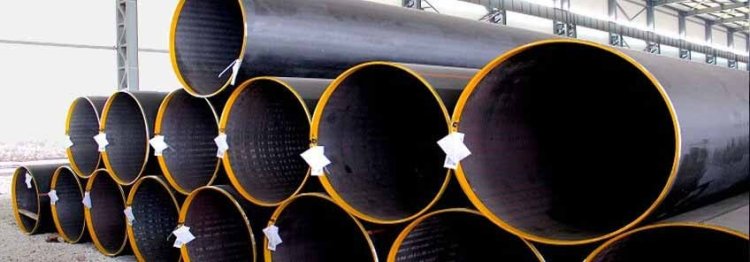Exploring the Durability and Versatility of Carbon Steel Pipes in Heavy Industries
Carbon Steel Pipe
Share this Post to earn Money ( Upto ₹100 per 1000 Views )

Carbon Steel Pipes have become the go-to material for many industries, particularly in heavy-duty applications. Their unmatched strength, cost-effectiveness, and versatility make them the preferred choice in sectors ranging from oil and gas to construction. In this blog, we will explore the durability and versatility of CS Pipes, discussing their key features, benefits, and the variety of applications they serve in heavy industries.
What Makes Carbon Steel Pipes a Staple in Heavy Industries?
Carbon steel is an alloy composed mainly of carbon and iron, which gives it excellent strength, hardness, and durability. This combination of properties makes Carbon Steel Pipes ideal for heavy industrial use. CS Pipes come in different grades, including low, medium, and high carbon steels, which influence their properties, making them suitable for a wide range of applications.
Key Benefits of Carbon Steel Pipes
-
Strength and Durability - Carbon Steel Pipes are known for their exceptional strength. The high carbon content gives these pipes the ability to withstand extreme pressure and heavy loads. Whether it's used in pipelines carrying high-pressure fluids or structural applications, Carbon Steel Pipes are designed to last for years, withstanding the test of time.
-
Corrosion Resistance - While Carbon Steel Pipes are prone to corrosion compared to materials like stainless steel, they can still perform well when properly coated or used in the right environments. A protective coating or treatment can significantly increase their resistance to corrosion, ensuring longevity even in harsh conditions.
-
Cost-Effectiveness - One of the primary advantages of CS Pipes is their affordability. Carbon steel is less expensive than other alloys like stainless steel, making it a budget-friendly choice for large-scale industrial projects without compromising on performance.
-
Versatility - The versatility of Carbon Steel Pipes is another key benefit. They can be used in a wide range of industries, including oil and gas, construction, chemical processing, water treatment, and more. Their flexibility in terms of pressure tolerance, thickness, and material strength makes them suitable for various applications.
Applications of Carbon Steel Pipes in Heavy Industries
Carbon Steel Pipes play a crucial role in several industries due to their robustness and adaptability. Let's explore some of the major sectors where CS Pipes are used extensively:
1. Oil and Gas Industry
In the oil and gas industry, Carbon Steel Pipes are a critical component for transporting oil, gas, and other fluids over long distances. These pipes are used both in offshore and onshore pipeline systems due to their ability to withstand the high pressure and extreme temperatures often found in these environments. They also serve in oil refineries and gas processing plants where durability is paramount.
2. Construction and Structural Applications
Carbon Steel Pipes are widely used in construction for structural applications. Their strength makes them an ideal material for building support structures, scaffolding, and even in high-rise buildings. CS Pipes are also used in bridges and other large infrastructure projects due to their ability to handle heavy loads without bending or breaking.
3. Chemical Processing Plants
In chemical plants, Carbon Steel Pipes are frequently used to transport chemicals, liquids, and gases. Their resistance to wear and tear makes them ideal for handling abrasive or high-temperature materials. However, proper treatment or coating is often applied to protect against chemical reactions that could cause corrosion over time.
4. Water and Wastewater Systems
Carbon Steel Pipes are extensively used in water treatment facilities and sewage systems. Due to their strength and durability, they can handle the high pressures required for transporting water and wastewater over long distances. In some cases, these pipes are coated with special materials to ensure they do not degrade when exposed to moisture.
5. Power Generation
In power plants, Carbon Steel Pipes are used for both steam lines and cooling systems. These pipes must endure extreme temperatures and high-pressure conditions, making CS Pipes an excellent choice. Their thermal conductivity and ability to withstand temperature fluctuations make them a reliable material for these high-demand applications.
Durability Factors of Carbon Steel Pipes
The durability of Carbon Steel Pipes depends on various factors, including the specific type of carbon steel, environmental conditions, and maintenance practices. Here's a breakdown of how these factors affect their longevity:
1. Type of Carbon Steel
- Low Carbon Steel: Typically used in mild conditions and less demanding applications. It's easier to weld but not as strong as higher-carbon steels.
- Medium Carbon Steel: Offers a balance between strength and toughness. It is often used in applications where moderate wear resistance is required.
- High Carbon Steel: Known for its strength and hardness, high carbon steel is often used in applications that require high tensile strength, such as heavy-duty machinery.
2. Environmental Conditions
Carbon Steel Pipes can be exposed to various environmental factors that influence their durability:
- Temperature: High or fluctuating temperatures can cause thermal expansion, which may affect the pipe's integrity.
- Humidity: In humid conditions, carbon steel is more prone to rusting, so proper coating or protective barriers are essential.
- Exposure to Chemicals: Some chemicals can cause corrosion, so it's crucial to choose the right type of carbon steel pipe for specific applications.
3. Maintenance and Coatings
The right maintenance and coatings can greatly extend the lifespan of Carbon Steel Pipes. Applying a protective layer such as paint, galvanization, or epoxy coatings can significantly reduce the effects of corrosion. Regular inspection and cleaning are also critical to maintaining the pipe’s functionality.
Conclusion
Carbon Steel Pipes continue to be an essential part of the heavy industrial landscape due to their durability, versatility, and cost-effectiveness. Whether in oil and gas transportation, construction, or chemical processing, these pipes offer unmatched strength and resistance to wear, making them ideal for demanding applications. The ability to customize these pipes to fit specific needs further enhances their adaptability across various industries.







